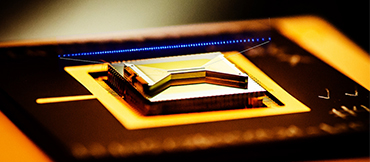 A fabricated trap that researchers use to capture and control atomic ion qubits (quantum bits). (Credit: K. Hudek/IonQ and E. Edwards/JQI)NSF has announced a $15 million award to a collaboration of seven institutions including the University of Maryland. The goal: Build the world’s first practical quantum computer.
A fabricated trap that researchers use to capture and control atomic ion qubits (quantum bits). (Credit: K. Hudek/IonQ and E. Edwards/JQI)NSF has announced a $15 million award to a collaboration of seven institutions including the University of Maryland. The goal: Build the world’s first practical quantum computer.
"Quantum computers will change everything about the technology we use and how we use it, and we are still taking the initial steps toward realizing this goal," said NSF Director France Córdova. "Developing the first practical quantum computer would be a major milestone. By bringing together experts who have outlined a path to a practical quantum computer and supporting its development, NSF is working to take the quantum revolution from theory to reality."
Dubbed the Software-Tailored Architecture for Quantum co-design (STAQ) project, the new effort seeks to demonstrate a quantum advantage over traditional computers within five years using ion trap technology.
The project is the result of a National Science Foundation Ideas Lab—a week-long, free-form exchange among researchers from a wide range of fields that aims to spawn creative, collaborative proposals to address a given research challenge. The result of each Ideas Lab is interdisciplinary research that is high-risk, high-reward, cutting-edge and unlikely to be funded through traditional grant mechanisms.
JQI Fellow Christopher Monroe will lead the team developing the hardware. JQI Fellow Alexey Gorshkov will be involved in the theory side of the collaboration.
Text for this news item was adapted from the Duke University and NSF press releases on the award.
Programmable ions set the stage for general-purpose quantum computers